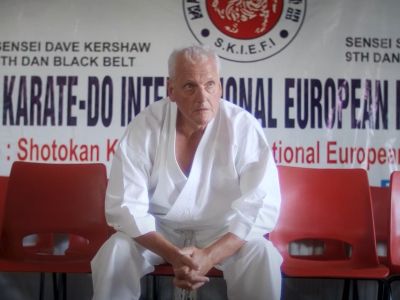David, a 66-year-old professional karate instructor from Grimsby, Lincolnshire, has spent decades teaching and competing in martial arts. But when worsening knee pain threatened to end his career, David turned to Thornbury Hospital and Consultant Orthopaedic Surgeon Mr Michael Edwards for a solution. Thanks to rotating platform knee replacement surgery, David is now back in the dojo, doing what he loves most.
Living with knee pain
David’s knee problems began early. At just 14, he underwent cartilage repair surgery following a football injury. In his 30s, arthritis set in, gradually affecting his ability to compete and teach karate. Despite trying physiotherapy and medication, the pain worsened, and David feared he might have to give up his lifelong passion.
“I worried my career would come to a premature end. The pain was getting worse, and I couldn’t perform at the level I needed to.”
After consulting with his doctor, David was advised that surgery would be the best option to treat his arthritis and restore his mobility.
Finding the right surgeon
David spent over a year researching his options. A fellow karate instructor recommended Mr Michael Edwards, known for his expertise in rotating knee replacement surgery. David was impressed by Mr Edwards’ understanding of the demands of martial arts – especially since he also holds a black belt in karate.
“Mike explained everything clearly. He told me this type of replacement suits more active people and would make a huge difference to my balance and mobility—and he was right.”
What is rotating platform knee replacement surgery?
Rotating platform knee replacement surgery is designed for highly active individuals. Unlike traditional knee replacements, which allow forward and backward movement, the rotating platform implant also mimics the natural twisting motion of the knee. This added flexibility makes it ideal for athletes and those with demanding physical routines.
“Mike had the answers to all my questions. I felt supported and informed going into such a major and relatively unusual procedure.”
Surgery and hospital experience
David says his experience at Thornbury Hospital was overwhelmingly positive. From the moment he arrived, he felt cared for by a team of professionals who understood his needs.
“My nurses were lovely. They helped me manage the pain and made sure I was comfortable. My anaesthetist even asked me about karate to put me at ease before surgery.”
David stayed in hospital for just one night. The morning after surgery, he was up and walking with the help of two physiotherapists, who guided him through tailored exercises to aid his recovery.
“My private room was smashing – comfortable with everything I needed. The food menu looked brilliant, though I didn’t get the chance to try dinner!”
Recovery and return to Karate
David followed his physiotherapy plan diligently, exercising three times a day for six weeks. His commitment paid off.
“I was back teaching in six weeks, easing into it slowly. At my eight-week follow-up, Mike was blown away by my progress – he even filmed me doing kicks and stances!”
Today, David continues to teach karate full-time and is regaining his fitness day by day. He credits the surgery with saving his career and recommends rotating knee replacement surgery to anyone with similar needs.
Disclaimer
We are very grateful to Circle Health Group – one of the providers we collect data from – and the team at its Thornbury Hospital for sharing David’s story with us so that we can share it with you. However, please note that PHIN provides information to support your healthcare decisions, but we do not recommend individual providers. It’s important that you explore all your options before choosing where and how to receive treatment.
Some patients may base their decision on the cost of treatment (if they are self-funding), while others may follow the guidance of their private medical insurer. Others might prioritise the experience of the consultant or factors related to the hospital, such as its regulator rating, location, or facilities.
We encourage you to research thoroughly and make an informed decision that’s right for you. We’re sharing David’s story to help you understand what your experience might be like and to support you in asking the right questions when considering your healthcare options.
